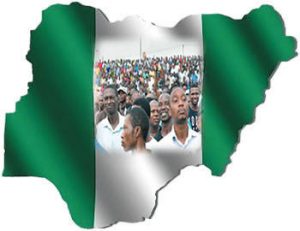Where I come from, it is a borderline taboo for someone to yawn without closing their mouth. It is said that when you yawn without getting your hand in the way, the devil would spit or urinate in it. Consequently, your words and even very presence in a place would mean a deadly infestation by everything that is evil.
Today, the very ground upon which we dwell seems to be yawning itself. It is this same gap the devil has exploited in laying waste on the land.
- Buhari joins prayers for unity, peace as Muslims end Tafsir
- How social media was used to expose Boko Haram suspects who sneaked into Kano
Whether you are considering the recent unrest in many Nigerian cities, or those across the globe in Europe, the Middle East, and Africa, young people’s voices are crying out to be heard. The #EndSARS protests for instance could have snowballed into a Nigerian Spring – and not the type that would have destroyed the yoke of the oppressive leadership structure across the land but the type that would render Nigeria into another Libya or Syria. Such an outcome would be more devastating to the entirety of West Africa than a megaton nuclear strike in every country in the region if not the continent.
A youth activist “reformation” has been unfolding quietly under our noses for years, giving a proper burial to the old concept that young people are to be seen and not heard.
It is heartwarming though that more youth programmes under the sponsorship of both public and private entities, individuals as well as international NGOs, today treat young people as assets and resources, as opposed to recipients, victims, or problems to be fixed. More youths are now assuming leadership roles, especially in their communities, just as we have also begun including women in sharing their concerns and their suggestions for a better world. And they are volunteering at record rates, more than any generation in history.
But Nigeria’s and even the world’s current events, especially poverty and terrorism, are shining a big spotlight on the slow pace of this reform.
Every entity is taught to know its competition and Nigeria and its citizenry must know theirs: ISWAP, Boko Haram, Ansaru, ESN and countless kidnapping, armed robbery, trafficking and oil theft gangs operating in the country. These groups recognise what kings and conquerors have known for millennia: young people make very effective warriors for achieving their ends. The disaster we already have in our hands will be child’s play if we do not wake up fast.
To avert this looming cataclysm, a new normal that effectively and productively leverages the energies of young Nigerians must be effectuated with swift dispatch. Children and youth, ages 5-25, can make their communities and the country healthier, smarter, safer, cleaner, greener, fairer and kinder. If you don’t have a youth strategy, you don’t have a strategy at all. Twenty years into the new century, many people still don’t understand this.
There are more young people in Nigeria and on the planet than at any time in human history. Half the world’s population is under 25 years old; 40 per cent is under 19. In a nutshell, the older generations are overwhelmingly outnumbered and this is a cause for concern as much as it should by default be a cause for great hope. Young people are always at the centre of social progress. Yes, the youth bubble can be harnessed for good.
Young people are biologically wired for the three critical assets that lead to social improvement: novelty, risk, and peer authority. It’s no coincidence that many American high-tech companies like UPS, Microsoft, Apple, HP and Dell for instance were all started by teenagers on bicycles and in garages and dormitories. But that is because the system works to a considerable degree in America unlike in Nigeria. Brain science confirms the unique power of young people to see new things and then take the risks to bring them to the rest of us. Because young people listen to each other more than they listen to adults, they also bring their entire generation along with them. Yes, biology is on our side.
Every parent knows the intrinsic value of starting early, whether it’s reading, computation, sports, or the arts. What you learn and do in childhood will stay with you for the rest of your life. In the same way, there is a deep connection between youth service and lifelong service and even philanthropy. Yes, childhood is on our side.
The world’s problems today are extremely complex and interrelated, driven by competing political, social and economic forces. Climate change and humanity’s role are now backed by irrefutable science and clean water, the essence of all life is in scarce supply in many parts of the world. This phenomenon, the diminution of Lake Chad, has been identified as one of the causative factors for the intractable nature of the Boko Haram crisis. The desertification of the northern part of Nigeria could also be a contributing factor to explosion of deadly banditry in the North West and North Central parts of the country. Simply put, we cannot afford for young people to grow up before they learn about and help solve our biggest challenges. No, time is not on our side.
Before it is too late, we must raise our hands against the devil and block the yawning gap before there is too much bile and venom in our mouths. The new normal must envision and work toward a scenario where young Nigerians take the lead in changing the country and the world at large. Working with partners in and outside Nigeria, we must help young people find their voice, take action and make an impact on vital community issues. Young people have always been at the centre of social change and we ignore their potential to reshape the world at our peril. If the civilised, law-abiding society does not engage them, someone else certainly will.
Huzaifa Jega is a management consultant and lives in Abuja

 Join Daily Trust WhatsApp Community For Quick Access To News and Happenings Around You.
Join Daily Trust WhatsApp Community For Quick Access To News and Happenings Around You.


